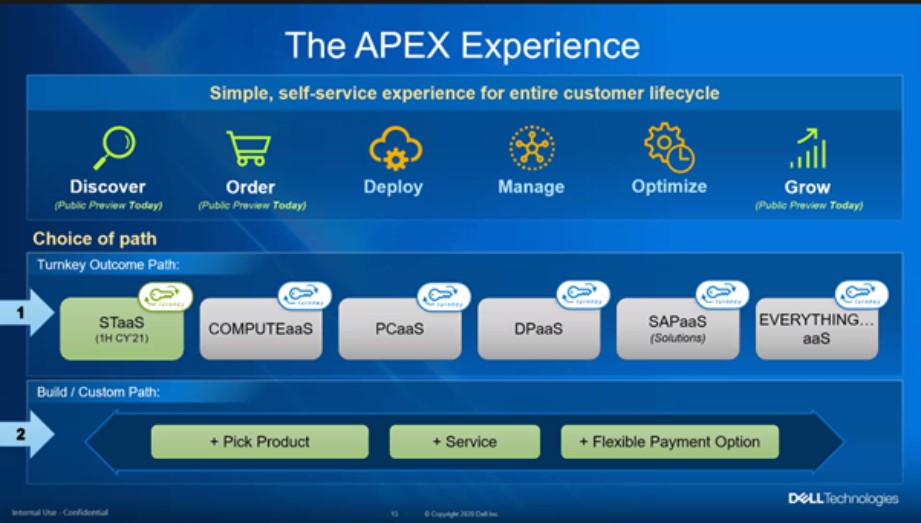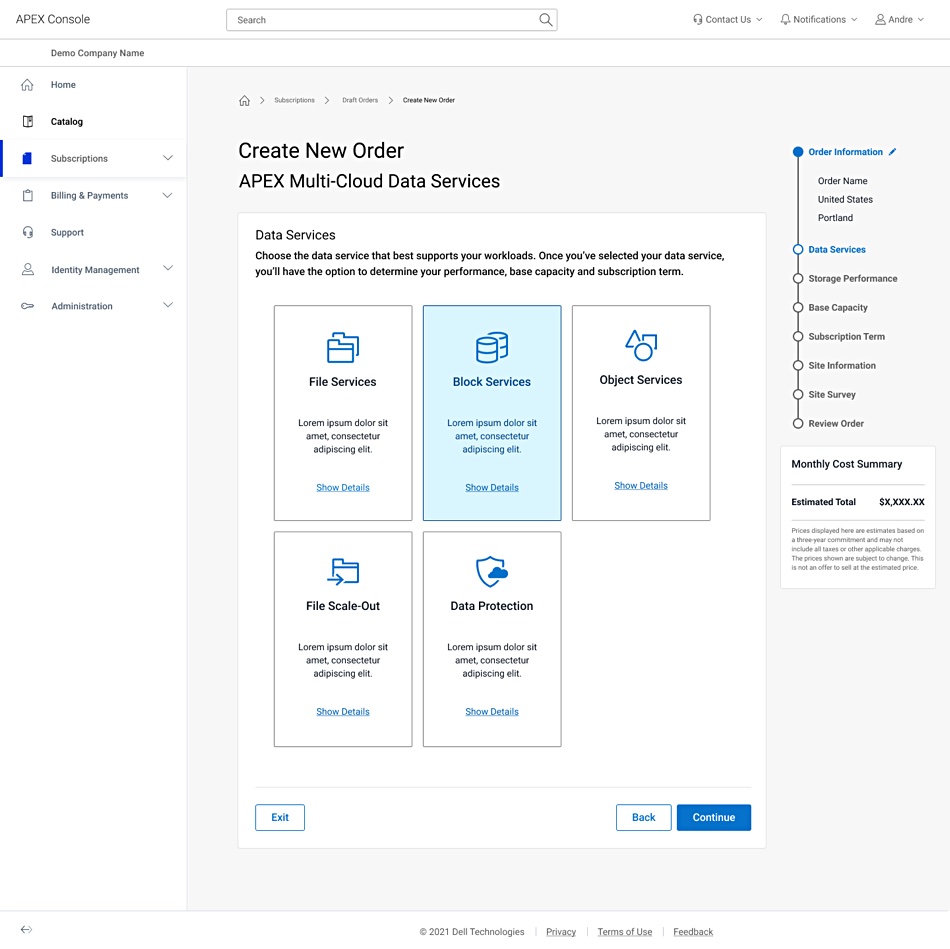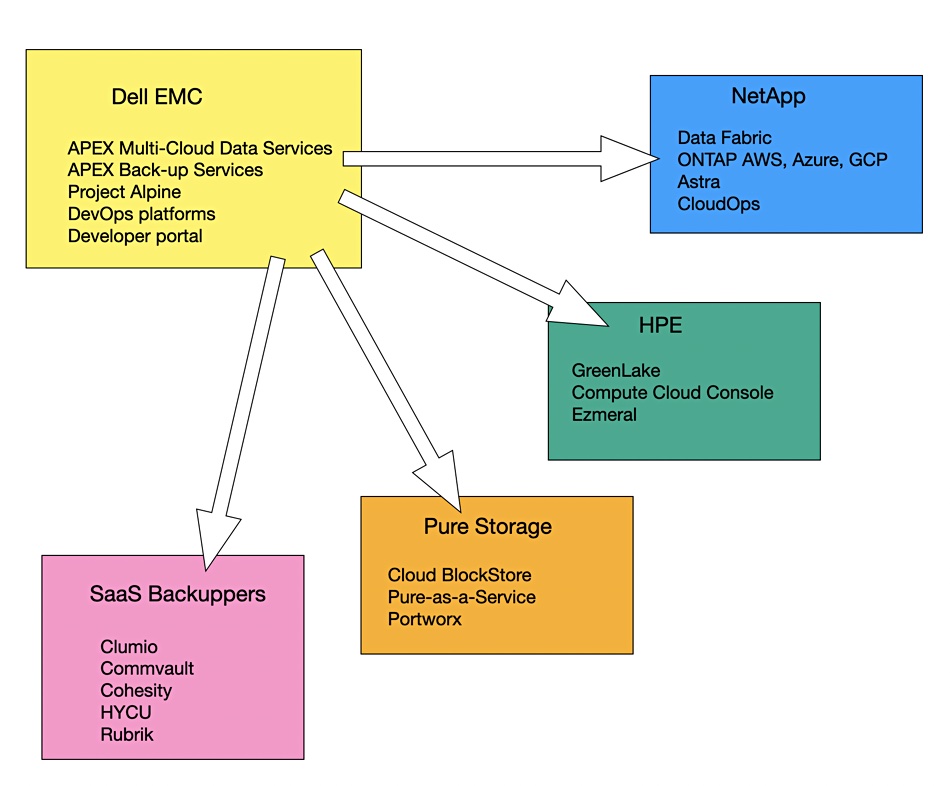Dell Technologies is announcing storage and data protection services across the on-premises and multiple public cloud environments, along with enhanced Kubernetes support for enterprises adopting hybrid multi-cloud and cloud-native app development.
The company believes the mainstream enterprise storage, and systems, market is adopting the hybrid, multi-cloud model with a mix of on-premises and public cloud application deployments. On that basis customers want public cloud-like service deals for on-premises hardware and software, consistent application storage environments across the on-premises and multiple public cloud environments, and consistent support for cloud-native DevOps developers, app development and deployments. This positions Dell as responding to customer concerns and various multiple competitive moves by HPE, NetApp and Pure Storage as well as a group of suppliers offering SaaS backup services.
Jeff Boudreau, Dell Technologies Infrastructure Solutions Group president, was quoted in Dell’s announcement: “Today’s multi-cloud reality is complex as data becomes more distributed across on-premises and colocation datacentres, multiple public clouds and edge environments.”
Dell, he claimed, is uniquely positioned “to help customers take control of their multi-cloud strategy” because “we have the industry’s broadest technology portfolio, consistent tools, experience building open ecosystems and leading data storage capabilities, services and supply chain.”
There are futures here because not everything Dell is talking about is ready. The company is announcing APEX Multi-Cloud Data Services delivering storage and data protection as-a-service with simultaneous access to all major public clouds through a single console. This includes:
- APEX Backup Services for SaaS applications, endpoints and hybrid workloads in the public cloud;
- Project Alpine to offer Dell’s block and file storage software on the main public clouds;
- Enhanced Kubernetes support for DevOps and developer portal.

Dell’s APEX initiative was first announced in October 2020 with a set of pay-as-you-go services covering hardware and software products.
The idea is to make the on-premises and public cloud IT worlds similar in terms of IT component delivery, scalability and payment. Dell says APEX Multi-Cloud Data Services, integrated with an APEX Console, will will provide file, block, object and data protection services for simultaneous access to all major public clouds from a single source of data. It will, Dell claims, help avoid public cloud vendor lock-in, excessive egress fees, and the cost and risk associated with moving data from one cloud to another.
HPE with GreenLake and Pure Storage (Pure1 Digital Experience) have as-a-service offerings for their storage products.
Regarding APEX Backup Services, we wrote in April last year, “Dell EMC today officially confirmed backup-as-a-service, built on PowerProtect systems and Druva software. PowerProtect Backup Service supports SaaS applications like Microsoft 365, Google Workspace, Salesforce and other cloud-based workloads, as well as endpoints and hybrid workloads.”
Dell’s Caitlin Gordon, VP for product management, said various ecosystem partners may have roles in the APEX initiative but Dell was not sharing who was providing what technology or services.

Dell says APEX Backup Services can be deployed in minutes, scales on demand, and protects against cyberattacks with instant detection, rapid response and accelerated recovery.
Project Alpine
This is the future bit, with Dell saying it will build on its data protection cloud offerings to bring the software IP of its block and file storage platforms to leading public clouds. Think AWS, Azure, GCP and the Oracle cloud. Supporting Oracle cloud alongside the others is, we think, unique to Dell. The actual block and file storage software will be based on Dell’s flagship products.
Gordon said “We will be bringing our flagship block and file storage software to the major public clouds. This is really huge for our customers. … Our storage portfolio today is predominantly delivered in purpose-built appliances. Technically, what we’re doing here is we’re abstracting that storage software from that underlying physical hardware. We’re enabling that to run on the general purpose instances that are in the different public clouds.”
We asked, is this PowerStore (block) and PowerScale (file) software? Gordon said “We’re not sharing the specific platforms. … What we have prioritised right now, and the roadmap that very much exists and is being developed, is focused on our two flagship [technologies or products] one in … block, and one in file.”
She added: “This is the beginning of a pretty significant investment focus for us. … We’re going to continue to add more over time.”
How will customers get this technology? Gordon said “We will deliver that based … on both hyperscaler capability as well as market demand … either as software that a customer will manage, or … as a fully-managed service. That could be a Dell service or it could be a hyperscaler service.”
Customers will be able to purchase storage software as a managed service from the various cloud marketplaces, using existing cloud credits. There will be a consistent storage experience across the on-premises block and file and public cloud environments with easy sharing of data across multiple clouds.
We should see milestone announcements from Dell over the next 12 months. However, object storage is not included. Our belief is that object services will eventually be included but there is a problem in that, as Caitlin Gordon said: “In APEX Multi-Cloud Data Services that is ECS object absolutely today [but] in APEX Data Storage Services object is actually based off of the object access in PowerScale.” For consistency one object stack, or both, or a unified object stack, needs to be used.

The obvious competitive comparisons are with NetApp and its OEM deals with the top three public clouds. Pure also has its Cloud Block Store for AWS and Azure.
Kubernetes expansion
Dell is adding increased support for Kubernetes including:
- Amazon EKS Anywhere on PowerFlex and PowerStore, enabling customers to run Kubernetes orchestration across public or on-premises clouds;
- SUSE Rancher on VxRail, providing multi-cluster, multi-cloud Kubernetes management and giving customers the flexibility to choose their cloud orchestration platform.
The Dell Technologies Developer portal capabilities are being expanded, from a one-stop shop point of view both for developers and DevOps teams. The portal will provide continual access to the latest Dell APIs, SDKs, modules and plug-ins.
Availability
APEX Multi-Cloud Data Services is planned for deployment in the USA, UK, Germany and Australia later this quarter. APEX Backup Services are now globally available.
The previously announced APEX Data Storage Services, which provides Dell-managed enterprise storage as-a-service, is available with colocation services via Equinix International Business Exchange datacentres. It is now available in the United States, United Kingdom, France, Germany, Denmark, Norway, Australia, New Zealand, Spain, Italy, Sweden, Finland, Ireland and Singapore.
APEX Cloud Services with VMware Cloud, also previously announced, is now available in the USA, UK, France and Germany.








